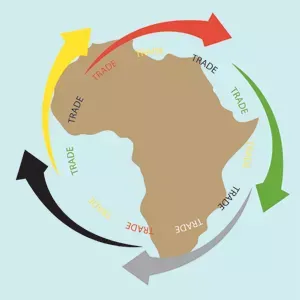For most of modern history, Africa has been excluded from the core of global trade. While the rest of the world formed powerful trade blocs and economic alliances, Africa was never given a seat at the table. Instead, it was treated as a source of raw materials and cheap labor, used by empires and foreign powers to extract wealth without building long-term infrastructure or empowering African nations to trade on equal terms. Even today, Africa’s role in global trade remains limited, despite its vast resources and growing population.
This long standing exclusion raises an important question: Why is the world suddenly paying attention now? When U.S. President Donald Trump imposed trade barriers and challenged international cooperation, European leaders responded by saying things like “the world must unite against Trump” to protect free trade and global cooperation. But where was that unity when Africa was left out for decades? When the global economy was designed in a way that benefited wealthy nations, while African countries remained at the bottom of global supply chains?
The truth is, Africa has been marginalized not because it lacked potential, but because the global trade system was never designed to include it. It was created by and for the industrial powers of the Global North, often through colonial legacies, protectionist policies, and unfair trade rules that made it hard for African nations to compete. For years, Africa’s economies were structured around exporting raw materials and importing expensive goods, creating a cycle of dependency and underdevelopment.
But something is beginning to shift.
Africa is no longer waiting to be included. Through initiatives like the African Continental Free Trade Area (AfCFTA), the continent is starting to build its own path. AfCFTA brings together 54 countries into a unified market of over 1.4 billion people. If it succeeds, it could transform Africa into a powerful economic force, strengthening intra-African trade, increasing local production, and reducing dependency on foreign markets. It marks a historic moment as Africa takes steps to reclaim control over its economic future.
At the same time, global attention toward Africa is growing. This shift is not necessarily due to a new sense of fairness, but because the continent has become strategically important. As the world transitions toward green energy and advanced technologies, demand for critical minerals like lithium, cobalt, and rare earth elements, many of which are found in Africa, is rising rapidly. The continent also holds vast solar energy potential, a young and growing population, and a booming digital economy. Governments, investors, and companies around the world are realizing that Africa holds the key to the future.
Meanwhile, emerging powers like China, India, and Russia are deepening their engagement with African nations through investments, trade deals, and infrastructure projects. This gives African governments more leverage to choose partners, negotiate better terms, and avoid being dominated by any single global power. It creates a more multipolar global landscape in which Africa has the opportunity to assert itself, if it acts strategically and in unity.
However, the road ahead remains challenging. Many African countries still struggle with corruption, weak infrastructure, low industrial capacity, and unequal access to education and technology. To fully benefit from this moment, Africa must invest in good governance, innovation, education, and regional cooperation. It must also focus on adding value to its exports, developing its manufacturing sectors, and presenting a united front in global forums.
In conclusion, Africa was never given a real place in global trade, and this exclusion has lasted for centuries. But now, with internal reforms, shifting global interests, and a rising generation demanding change, a new opportunity has emerged. The world is paying attention, not out of generosity, but because, after economic tensions and trade wars between the U.S. and Europe, Africa has become too important to ignore. The key question is whether Africa will use this moment to gain lasting empowerment, not just to join the global economy on others’ terms, but to reshape it on its own.
Faisal Aligas, International affair
Isha Peace and Governance Institute,
Laas-Caanood, Dowlada Goboleedka SSC-Khaatumo, Soomaaliya.



Ingen kommentarer:
Legg inn en kommentar